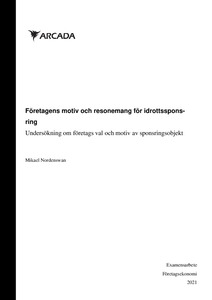Suggestions on Enhancing Intrinsic Motivation in A Technology Company Team
Lemmetty, Olivia (2025)
Lemmetty, Olivia
2025
Julkaisun pysyvä osoite on
https://urn.fi/URN:NBN:fi:amk-2025052214866
https://urn.fi/URN:NBN:fi:amk-2025052214866
Tiivistelmä
This thesis explores intrinsic motivation within a team in an international technology company, with the goal of providing suggestions to enhance employee satisfaction and team performance. Recognizing a gap in understanding intrinsic motivation in the studied team, the research aimed to offer actionable insights for the manager and team leaders to create a more supportive and motivating work environment. The research was guided by two research questions: (1) What are the key factors that influence intrinsic motivation in the studied team? and (2) How does the team perceive autonomy, competence, and relatedness at work?
Based on Deci and Ryan’s self-determination theory, which identifies autonomy, competence, and relatedness as core psychological drivers of intrinsic motivation, the research adopted a qualitative case study approach. Data was collected through semi-structured interviews and analysed using deductive content analysis.
The findings revealed that autonomy was strongly supported through flexibility and freedom, expressed through flexible working arrangements, a high level of trust and an absence of micromanagement. Relatedness emerged as a clear strength, underpinned by a collaborative culture, empathetic leadership, and strong interpersonal relationships. In contrast, competence was identified as the most complex and least consistently supported factor. While many team members felt confident in their skills, this was sometimes challenged by frequent process changes, lack of constructive feedback and limited structured development opportunities.
The research provided a clear view of the factors shaping intrinsic motivation in the team. It offers practical recommendations for leadership aimed at strengthening competence, sustaining autonomy, and reinforcing relatedness. It can be stated that to enhance autonomy, the manager and team leaders could offer more flexibility regarding office days and make sure to maintain manageable workloads and rotate accounts when needed, to keep team members satisfied, motivated and enable learning. To enhance competence, the manager and team leaders should facilitate learning and adaptation in frequent process changes, offer more support in career growth and provide sufficient time for training and development by leading by example. Most importantly, they should provide constructive feedback and recognition. Additionally, the leaders could provide side projects to the team members and introduce voluntary, achievable KPIs, to increase motivation. To enhance relatedness, the leaders should make sure to maintain quarterly team events, even if it would require the team members to use their own budget.
These insights align with previous research and provide a clear view on the key factors to the team’s intrinsic motivation and its experience of autonomy, competence and relatedness at work. The thesis also provided concrete actions for building a more intrinsically motivated team.
Based on Deci and Ryan’s self-determination theory, which identifies autonomy, competence, and relatedness as core psychological drivers of intrinsic motivation, the research adopted a qualitative case study approach. Data was collected through semi-structured interviews and analysed using deductive content analysis.
The findings revealed that autonomy was strongly supported through flexibility and freedom, expressed through flexible working arrangements, a high level of trust and an absence of micromanagement. Relatedness emerged as a clear strength, underpinned by a collaborative culture, empathetic leadership, and strong interpersonal relationships. In contrast, competence was identified as the most complex and least consistently supported factor. While many team members felt confident in their skills, this was sometimes challenged by frequent process changes, lack of constructive feedback and limited structured development opportunities.
The research provided a clear view of the factors shaping intrinsic motivation in the team. It offers practical recommendations for leadership aimed at strengthening competence, sustaining autonomy, and reinforcing relatedness. It can be stated that to enhance autonomy, the manager and team leaders could offer more flexibility regarding office days and make sure to maintain manageable workloads and rotate accounts when needed, to keep team members satisfied, motivated and enable learning. To enhance competence, the manager and team leaders should facilitate learning and adaptation in frequent process changes, offer more support in career growth and provide sufficient time for training and development by leading by example. Most importantly, they should provide constructive feedback and recognition. Additionally, the leaders could provide side projects to the team members and introduce voluntary, achievable KPIs, to increase motivation. To enhance relatedness, the leaders should make sure to maintain quarterly team events, even if it would require the team members to use their own budget.
These insights align with previous research and provide a clear view on the key factors to the team’s intrinsic motivation and its experience of autonomy, competence and relatedness at work. The thesis also provided concrete actions for building a more intrinsically motivated team.
Kokoelmat
Samankaltainen aineisto
Näytetään aineisto, joilla on samankaltaisia nimekkeitä, tekijöitä tai asiasanoja.
-
Företagens motiv och resonemang för idrottssponsring: Undersökning om företags val och motiv av sponsringsobjekt
Nordenswan, Mikael (2021)Sponsring, och i synnerhet idrottssponsring, har vuxit till en stor och viktig del av företagens marknadsföringsstrategier. Genom att sponsra enskilda idrottare, lag, föreningar eller andra idrottsrelaterade sponsringsobjekt, ... -
Motivation and Satisfaction of Employees. Influence of Cultural Differences on Motivation
Zubova, Ekaterina (Saimaan ammattikorkeakoulu, 2014)The objective of this research was to learn about factors that might lead to employees’ job dissatisfaction and factors that motivate employees. Also the aim was to understand how cultural differences can influence employees’ ... -
Kvinnor och bäckenbottenträning : en teoretisk studie med fokus på information och motivation. Utvecklingsarbete: En föreläsning baserad på examensarbetet: Kvinnor och bäckenbottenträning. En teoretisk studie med fokus på information och motivation.
Jaatinen, Laura; Södergran, Linda (Yrkeshögskolan Novia, 2013)Examensarbete: Syftet med detta examensarbete är att beskriva den information som ges åt kvinnor angående bäckenbottenträning samt hur kvinnor motiveras till denna träning. Genom att ta reda på detta vill respondenterna ...



